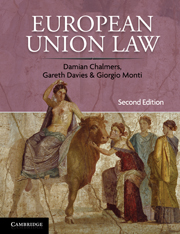Book contents
- Frontmatter
- Contents
- Map
- Preface
- Abbreviations
- Table of Cases
- Table of Treaties, Instruments and Legislation
- Table of Equivalents
- Electronic Working Paper Series
- 1 European Integration and the Treaty on European Union
- 2 The EU Institutions
- 3 Union Law-making
- 4 The EU Judicial Order
- 5 The Authority of EU Law
- 6 Fundamental Rights
- 7 Rights and Remedies in National Courts
- 8 Infringement Proceedings
- 9 Governance
- 10 Judicial Review
- 11 EU citizenship
- 12 EU Law and Non-EU Nationals
- 13 Equal Opportunities Law and Policy
- 14 EU Criminal Law
- 15 External Relations
- 16 The Internal Market
- 17 Economic and Monetary Union
- 18 The Free Movement of Goods
- 19 The Free Movement of Services
- 20 The Pursuit of an Occupation in Another Member State
- 21 Trade Restrictions and Public Goods
- 22 EU Competition Law: Function and Enforcement
- 23 Antitrust and Monopolies
- 24 State Regulation and EU Competition Law
- Index
9 - Governance
- Frontmatter
- Contents
- Map
- Preface
- Abbreviations
- Table of Cases
- Table of Treaties, Instruments and Legislation
- Table of Equivalents
- Electronic Working Paper Series
- 1 European Integration and the Treaty on European Union
- 2 The EU Institutions
- 3 Union Law-making
- 4 The EU Judicial Order
- 5 The Authority of EU Law
- 6 Fundamental Rights
- 7 Rights and Remedies in National Courts
- 8 Infringement Proceedings
- 9 Governance
- 10 Judicial Review
- 11 EU citizenship
- 12 EU Law and Non-EU Nationals
- 13 Equal Opportunities Law and Policy
- 14 EU Criminal Law
- 15 External Relations
- 16 The Internal Market
- 17 Economic and Monetary Union
- 18 The Free Movement of Goods
- 19 The Free Movement of Services
- 20 The Pursuit of an Occupation in Another Member State
- 21 Trade Restrictions and Public Goods
- 22 EU Competition Law: Function and Enforcement
- 23 Antitrust and Monopolies
- 24 State Regulation and EU Competition Law
- Index
Summary
INTRODUCTION
This chapter considers EU governance. It is organised as follows.
Section 2 considers the nature of EU governance. Governance was set out at greatest length in the 2001 Commission White Paper. It comprises, in the first place, a series of norms guiding the exercise of Union power. These norms are openness, participation, accountability, effectiveness, coherence, subsidiarity and proportionality. The governance agenda in the White Paper also sets out an ethos as to how the European Union is to govern and when it is to govern. It suggests that the central mission of the Union is to solve problems that cannot be resolved by the Member States unilaterally. There is flexibility about the legal instruments to be deployed, as what matters is that the problem be resolved. The concern that the problem be resolved effectively and coherently also leads to a priority being given to expert knowledge, on the one hand, as this is seen as central to knowing the problem and the solution, and to impact assessment, on the other, as this requires policy-makers to anticipate the effects of the policy on others. Finally, the commitment to openness and participation has led to an engagement by the Union with the idea of a pan-European civil society.
Section 3 examines the principles of subsidiarity and proportionality. Subsidiarity sets out when, acting within its powers, the Union should intervene. It is based around two logics.
- Type
- Chapter
- Information
- European Union LawCases and Materials, pp. 350 - 395Publisher: Cambridge University PressPrint publication year: 2010



